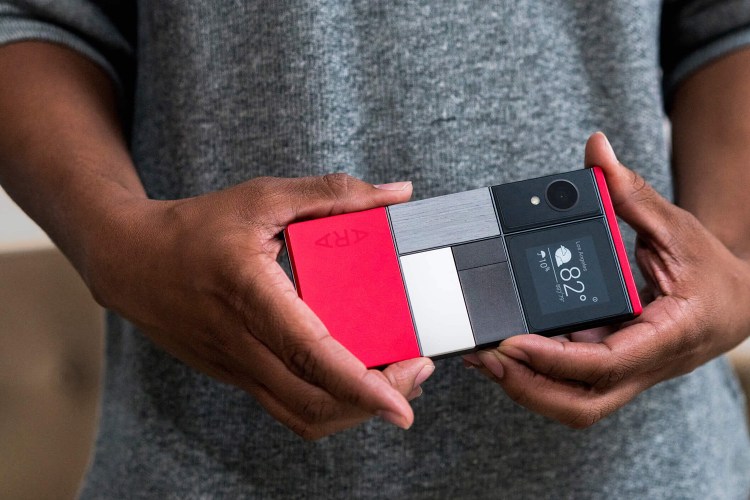testsetset
Google’s ambitious plan to bring modular smartphones to market, Project Ara, has been suspended.
While there’s still a chance that Google will breathe new life into Ara by licensing it to third parties, the company — plagued by delays and talent drain — long ago abandoned its original vision: to dramatically reduce e-waste and bring an “open hardware ecosystem” to billions of people.
In light of Google’s shrinking ambitions for modularity, here’s a brief look at the history of Project Ara and the dashed hopes of those involved.
- September 10, 2013: Dutch designer Dave Hakkens publishes a video outlining his vision of “Phonebloks,” a modular smartphone designed to curtail smartphone waste. The project promptly goes viral.
- October 28, 2013: Motorola, then owned by Google, unveils “Project Ara”: a plan to “bring the benefits of an open hardware ecosystem to 6 billion people.” According to Motorola, the project had already been in development “for over a year” within its Advanced Technology, and Projects group (ATAP) and would now join forces with Hakkens and the Phonebloks community. Motorola aims to release an alpha version of a “Module Developer’s Kit (MDK)” that winter.
- January 29, 2014: Google sells Motorola Mobility to Lenovo, keeps Motorola’s ATAP group, including Project Ara, among other things.
- February 20, 2014: Google unveils Project Tango, Google’s other ambitious smartphone project.
- February 27, 2014: Google plans 2015 release of basic $50 modular phone with only Wi-Fi connectivity.
- April 4, 2014: Google previews prototype of Ara’s main “Endo” module.
- April 10, 2014: One month behind schedule, Google releases its Module Developers Kit (MDK), a guide detailing technical design ideas and plans for Ara.
- July 2, 2014: The lead designer for Project Ara, Dan Makoski, departs.
- July 14, 2014: Google begins accepting applications for Ara developer boards for developers interesting in building modules.
- October 29, 2014: Video of Spiral 1, the first working Ara prototype, is released. The prototype was developed by NK Labs.
- January 14, 2015: Google unveils second Ara prototype, Spiral 2, with a 3G modem, 11 unidentified prototype modules, and colorful module designs. The Ara team scraps its heavy dependence on 3D printing for “a dye sublimation process.” VentureBeat goes hands-on. Google also announces a Puerto Rico “market pilot,” with plans to kick it off sometime in 2015.
- April 28, 2015: A startup called Nexpaq launches a Kickstarter project for a modular smartphone case that was in development for “over two years.”
- June 1, 2015: Project Ara technical lead, Paul Eremenko, departs for Airbus.
- August 2015: Following the formation of Google parent company Alphabet, ATAP remains inside Google.
- August 17, 2015: Google cancels Puerto Rico-specific pilot, plans 2016 pilot.
- February 21, 2016: LG unveils semi-modular G5 smartphone with expansion slot.
- April 14, 2016: Facebook poaches the leader of Google’s ATAP group, Regina Dugan.
- May 20, 2016: Google says its Ara modular smartphone will be ready for sale in 2017 and promises to release a developer edition in the fourth quarter of 2016. The company announces that its base frame will contain “all the functionality of a smartphone.” Google releases new teaser video spotlighting the potential of swappable modules.
- May 28, 2016: Phonebloks creator Hakkens criticizes Google for deciding to build core parts of the Ara smartphone into the frame, possibly undermining Hakkens’ vision of reducing e-waste. Hakkens says Ara should be an “open standard” and “shouldn’t be in the hands of one organization.”
- June 9, 2016: Motorola, birthplace of Project Ara, unveils Moto Z smartphone with modular backplates.
- August 2016: Former ATAP and Ara design chief Makoski quietly begins working with Nexpaq through his consultancy firm, Garage Partners.
- September 1, 2016: A Reuters report claims that Google is “shelving” Ara, but suggests that it may license the project to third-party hardware companies.
- September 2, 2016: Google confirms to VentureBeat that it has suspended Project Ara.
June 5th: The AI Audit in NYC
Join us next week in NYC to engage with top executive leaders, delving into strategies for auditing AI models to ensure fairness, optimal performance, and ethical compliance across diverse organizations. Secure your attendance for this exclusive invite-only event.
Updated 6:20 p.m. PT with details on Makoski’s arrangement with Nexpaq.

